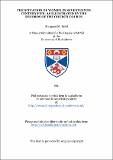The situation of women in seventeenth century Fife : as illustrated by the records of the Church courts
Abstract
Women, particularly those from the lower ranks in society, have received little attention from historians. In part this is due to the limited nature of the available sources. The present thesis is largely based on evidence taken from the records of the post-Reformation church courts, particularly kirk sessions and presbyteries. These offer the best source for a study of low-life social conditions in the early-modern period and often the only source as far as low-ranking women are concerned. Furthermore, unlike the clientele of civil and criminal courts, almost as many women as men appeared before the church courts. Court records naturally emphasise deviancy but, by extension they can indicate what was considered normal and desirable behaviour. In order to put deviancy into perspective, reference is made to certain other sources, particularly diaries, even although these were written by a higher-ranking section of society than the miscreants who were hauled up before the kirk session. Sexual offences, particularly fornication and adultery, formed the staple business of the church courts. As with other offences, these have been examined both on a quantitative and a qualitative basis to show change and stability in the pattern of offences and to give some indication, however fragmentary, of the expectations and reality of love, courtship and marriage for the lower ranks. Witchcraft was the most sensational and serious offence prosecuted although it was not as common as has often been supposed. Its importance lies in the fact that the witch embodied a negative image of womankind, a symbol of all that was feared and reviled in women in the seventeenth century. The final chapter deals with a miscellany of offences against religion and good order Sabbath-breaking, drinking, conventicling and recusancy, assault, riot, infanticide, slander, flyting and scolding. Women were heavily involved in some, but not all of these offences. Although women suffered discrimination in civil and political rights, church court records suggest that among lower-ranking men and women there was a greater degree of equality in practice than was allowed in theory.
Type
Thesis, MPhil Master of Philosophy
Collections
Items in the St Andrews Research Repository are protected by copyright, with all rights reserved, unless otherwise indicated.

